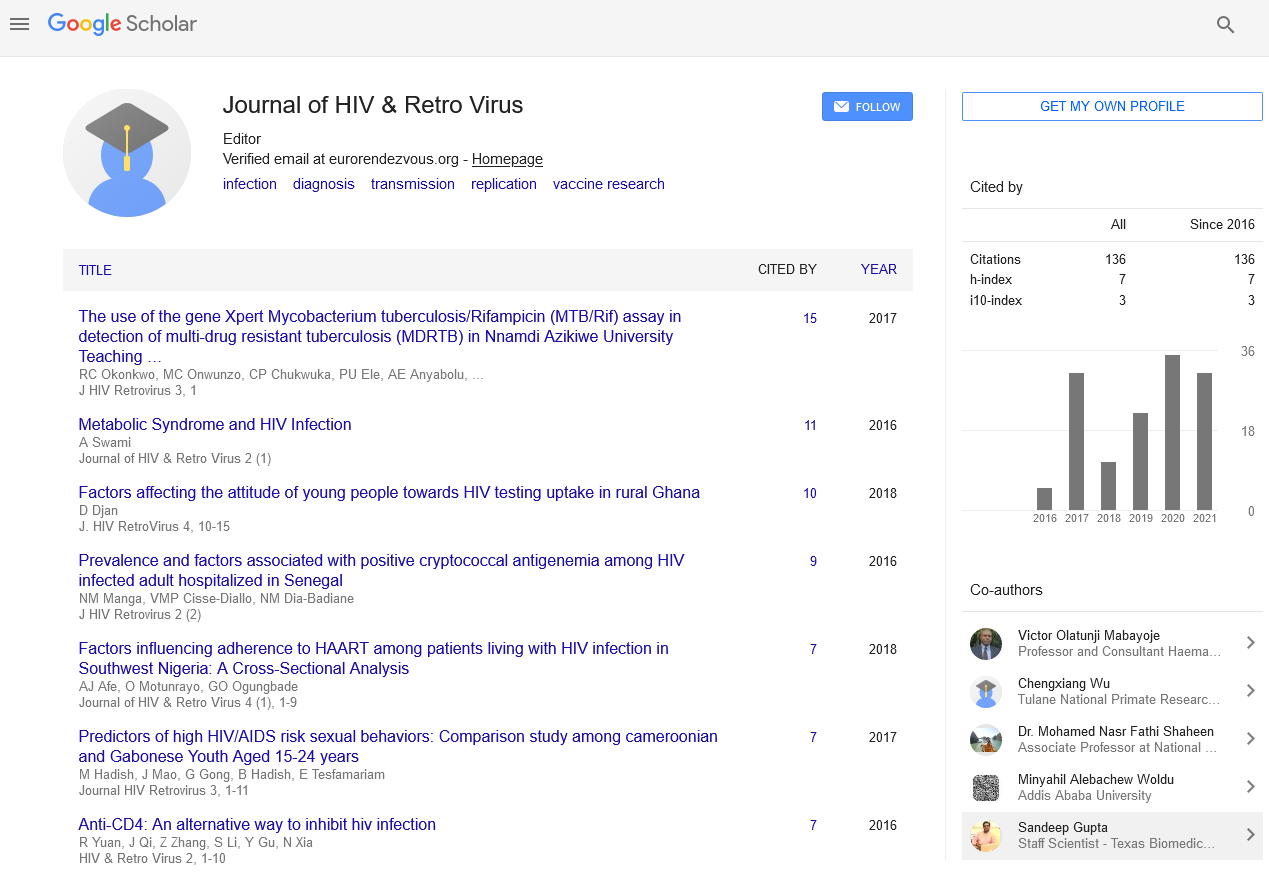Ogboi Sonny Johnbull*
Jedima Health International Health Consult Ltd., Lagos, Nigeria
- *Corresponding Author:
- Ogboi Sonny Johnbull
Jedima Health International Health Consult Ltd.
Lagos, Nigeria
Tel: 393806975057
Email:
ogboijb@yahoo.com
Received date: October 12, 2016; Accepted date: October 14, 2016; Published date: October 20, 2016
Citation: Johnbull OS. Only the funeral Industry is benefitting from HIV/AIDS in rural Nigeria. J HIV Retrovirus. 2016, 2:3
Copyright: © 2016 Johnbull OS. This is an open-access article distributed under the terms of the Creative Commons Attribution License, which
permits unrestricted use, distribution, and reproduction in any medium, provided the original author and source are credited.
Report
We have our hands tied because human immunodeficiency
virus/acquired immunodeficiency syndrome (HIV/AIDS) is
tightening its grips on Nigeria and threatening our populace with
heavy burden. “This genocide of our generation” has more
casualties than any other war as we are losing the leaders of
tomorrow” since our shift focussed on treatment instead of
prevention.
As of 2014 in Nigeria, the HIV prevalence rate among adults
ages 15-49 was 3.17 per cent. Nigeria has the second-largest
number of people living with HIV, as 9% of all people living with
HIV globally are in Nigeria, 14% of the global deaths from HIVrelated
illness are in Nigeria [1] and with a population of about
170 million and despite the recent drop in HIV prevalence to
4.4%, about 3.8-4.0 million people are now estimated to be HIV
positive with growth rate of 1500 per day with an infection
every minute. Over one million have died of the disease leaving
behind over 2 million orphans, now visibly seen in what once
were considered unlikely sites – RURAL COMMUNITIES.
Funeral is the final stage in the spectrum of care provided to
persons with HIV everywhere in Nigeria especially in rural
villages and since the discovery of AIDS (Acquired
immunodeficiency syndrome) in 1980, a fortune has gone into
the funeral industry especially at the rural communities in
Nigeria. Rural villages in Nigeria that contributes significantly to
the nation’s economy through agricultural activities are rife with
HIV/AIDS disease, but HIV is not always understood to be an
infection. Witch doctors and tribal lore abound - a belief that
any sickness resulting to AIDS is inflicted upon by a wicked man
or woman and can only be cured when the “gods” are appeased.
This belief has caused a horrific spike in the death of many
innocent who often are accused of “witch voodoos”. Many
infected people from the towns and cities across our beautiful
country, Nigeria are migrating to their rural villages to die, where
they are aware that care which they did not get while in the
towns/cities will be given to them by their own relations before
they die and be buried. Because 90% of the populations are
relying on the government for health care rather waiting for a
government program, unfortunately, many public hospitals are
already in dire of financial straits. But with the coming together
of various pharmaceutical companies to supply antiretroviral
drugs to Africa coupled with President Bush’s PEPFAR, these therapies have become unavailable and beyond the reach of
many people living with HIV/AIDS (PLWHA).
In Nigeria, “I feel angry, distressed, and helpless…to live in a
country where we have the means, the resources, to be able to
help all these patients- but what is lacking is the political will and
there is so much corruption among medical personnel that are
supposed to help distribute the drugs to PLWHA at subsidized
rate despite the high cost.
“PLEASE HEAR THE CASE OF A CLOSE FRIEND’S ACCOUNTANGELA”
Ah! OO!! AH!!! Angela groaned in pains as her 60 year
old frail mother struggled to clean her watering stool, which had
smeared her whole body. Apart from that, Angela, a promising
graduate of a university a few months earlier, could not control
saliva from dripping out of her mouth. Angela who is from
western Nigeria but living in the northern part of Nigeria with
her mother got infected with HIV/AIDS some years back on the
university campus when she was a student. Now that the
relations expect her to provide support after her compulsory
national youth service corps with a very lucrative job, she
brought HIV/AIDS. When she was diagnosed HIV positive, she
returned to her rural village after she was denied basic medical
treatment because of her seropositivity, to seek a traditional
cure, a situation that worsened her plight and led to the
degeneration of her health. In distant time, Angela had
developed a full blown AIDS. Her weak and frail mother, who
was a widow, was her only companion as all her relatives had
deserted her for fear of being infected with the disease.
When Angela eventually died, the world came to a standstill
for her mother as neither relative nor community members
came to commiserate with her or render the traditional
assistance of according final rights to her dead daughter. The
poor weak and frail widow was made to pay N11, 000 (about
$38) to local or coffin maker to have her daughter buried
coupled with other expenses paid to appease local gods.
The person arranging the funeral must pay for its cost
especially buying of coffin. Even after the purchase of the coffin
or casket, still no assistance was given to the widow for the rural
communities were afraid that the disease might inflict them as
discrimination against persons with HIV-related illnesses or
death and funeral services is very common. Also, another fetish
group has gone around with their “Voodoos” belief that
anybody that help in the burial of Angela will also die like her, until necessary sacrifices will be made and paid by the poor
mother to appease local gods. What a belief and exploitation?
This raised another point that ignorance, fear and intolerance
couples with fetish belief were fuelling the spread of HIV/AIDS in
rural communities and there is need for effective action and
redoubling of our effort to curb the spread.
The widow’s emotional trauma was however, lightened when
two young men who returned from the city came to
commiserate with her. But the young men defiled all entreaties
from their relatives’ fetish belief not to visit the widow and even
assisted her in burying the dead Angela. Blessed memories!
As I am writing this article, another coffin or casket maker and
the Voodoo groups are benefiting or making a fortune in one or
two communities afflicted by the HIV/AIDS pandemic where the
old are busy burying the youths.
Permit me to write as I conclude that Nigeria’s HIV-related
problems are mind-boggling and the real challenge of reducing
HIV/AIDS in rural communities comes not from the difficulty of
developing and change culturally appropriate training materials,
but changing the attitudes that lead to unsafe and unacceptable
behaviour particularly towards women and children. Media in
various local dialect especially radio should be used to educate
the rural communities about the dangers of careless sex and
HIV/AIDS.
References
- UNAIDS (2014) Gap report.

